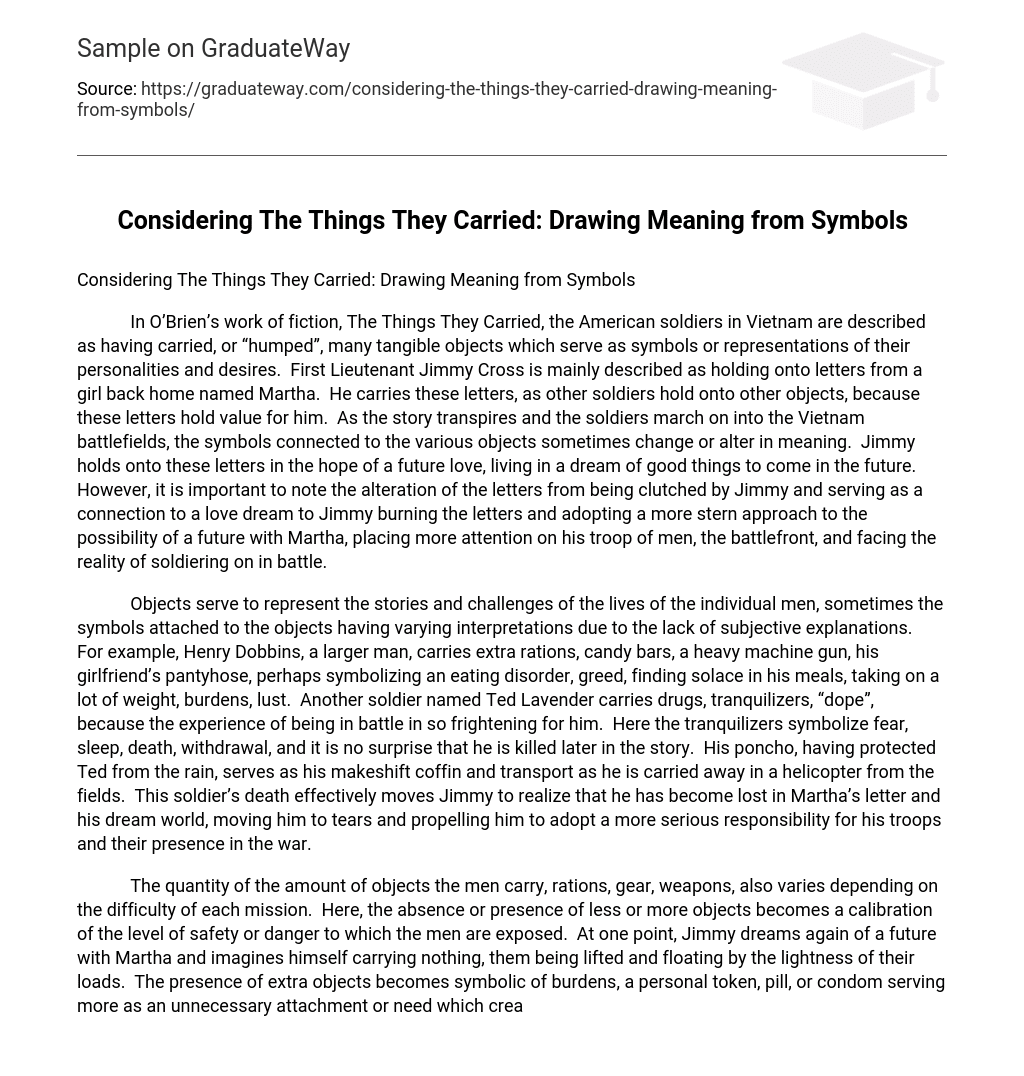In O’Brien’s work of fiction, The Things They Carried, the American soldiers in Vietnam are described as having carried, or “humped”, many tangible objects which serve as symbols or representations of their personalities and desires. First Lieutenant Jimmy Cross is mainly described as holding onto letters from a girl back home named Martha. He carries these letters, as other soldiers hold onto other objects, because these letters hold value for him. As the story transpires and the soldiers march on into the Vietnam battlefields, the symbols connected to the various objects sometimes change or alter in meaning. Jimmy holds onto these letters in the hope of a future love, living in a dream of good things to come in the future. However, it is important to note the alteration of the letters from being clutched by Jimmy and serving as a connection to a love dream to Jimmy burning the letters and adopting a more stern approach to the possibility of a future with Martha, placing more attention on his troop of men, the battlefront, and facing the reality of soldiering on in battle.
Objects serve to represent the stories and challenges of the lives of the individual men, sometimes the symbols attached to the objects having varying interpretations due to the lack of subjective explanations. For example, Henry Dobbins, a larger man, carries extra rations, candy bars, a heavy machine gun, his girlfriend’s pantyhose, perhaps symbolizing an eating disorder, greed, finding solace in his meals, taking on a lot of weight, burdens, lust. Another soldier named Ted Lavender carries drugs, tranquilizers, “dope”, because the experience of being in battle in so frightening for him. Here the tranquilizers symbolize fear, sleep, death, withdrawal, and it is no surprise that he is killed later in the story. His poncho, having protected Ted from the rain, serves as his makeshift coffin and transport as he is carried away in a helicopter from the fields. This soldier’s death effectively moves Jimmy to realize that he has become lost in Martha’s letter and his dream world, moving him to tears and propelling him to adopt a more serious responsibility for his troops and their presence in the war.
The quantity of the amount of objects the men carry, rations, gear, weapons, also varies depending on the difficulty of each mission. Here, the absence or presence of less or more objects becomes a calibration of the level of safety or danger to which the men are exposed. At one point, Jimmy dreams again of a future with Martha and imagines himself carrying nothing, them being lifted and floating by the lightness of their loads. The presence of extra objects becomes symbolic of burdens, a personal token, pill, or condom serving more as an unnecessary attachment or need which creates even more of a burden than perhaps is really best for the soldiers. The shedding of excess objects becomes a symbol of the man who is able to soldier well and independently, who can focus on the immediate threat and march with a lighter load. Although the amount of things carried increases with the difficulty of each battle, success is marked by a lessening of the difficulty of war and a reduction of items transported by the traveling men.
All in all, external, environmental props or objects serve well to illuminate and highlight character personalities and plot meaning, drawing together themes within works of fiction. O’Brien does a wonderful and thorough job of using these special and unique props to cast light on the lives and experiences of the Vietnam War soldiers. Jimmy in particular moves thorough a poignant metamorphosis where he matures in his sense of duty to the present realities of battle and gives more caring attention to himself and his men, rather than the dreams which had become burdens and distractions. The carried things hold definition for the lives of each unique soldier, but they also point to burdens which can be shed to lighten the load of each man while being involved in war.
Works Cited
O’Brien, Tim. The Things They Carried. Random House, Inc., 1998.





